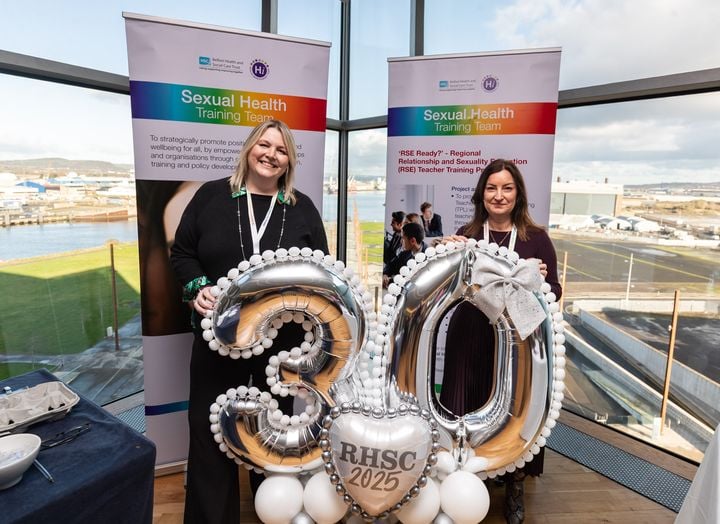Health
Belfast Clinics Report Increase in Hormonal Contraception Anxiety

Young people in Belfast are experiencing heightened anxiety regarding hormonal contraception, significantly influenced by trends on social media platforms like TikTok and Instagram. This surge in concern has potential implications for unplanned pregnancies in Northern Ireland, as highlighted by health professionals at the recent 30th Annual Regional Sexual Health Conference.
During the conference, Arlene McLaren, CEO of the sexual health charity Common Youth, addressed the critical issue of misinformation circulating online. She noted that young individuals encounter a mix of valid information and detrimental myths, with negative experiences receiving more attention than positive ones. This skewed perception is leading many young women to avoid hormonal contraceptive methods due to fears about potential side effects.
McLaren explained that the organization provides free and confidential sexual health services to individuals under 25 in Northern Ireland. She reported an increase in young women expressing concerns about side effects associated with hormonal contraception, such as weight gain and depression. Moreover, anecdotal reports from peers about contraceptive failures have further deterred youth from using reliable contraceptive methods.
In her remarks, McLaren pointed out the impact of influencer-driven trends, which often promote alternatives such as fertility awareness methods that may be less effective. “If we communicate well and provide accessible, factual guidance, we can really make a difference,” she remarked.
Understanding Contraceptive Options
The discussion highlighted the importance of educating young people about the various types of contraceptive pills available. There are primarily two categories: the combined pill and the progesterone-only pill, each marketed under different brand names. Dr. Caroline Hunter, a senior physician at Common Youth, shared a case study illustrating the confusion some young women face regarding contraceptive methods.
She recounted the experience of a 20-year-old woman who sought a pregnancy test after switching from the combined pill, known as Dianette, due to headaches. The patient was misinformed by her general practitioner about the precautions needed when changing pills. “She was told to be extra cautious for two weeks when she changed her pill. It’s supposed to be a week, but the GP threw in an extra week, just for good measure,” Dr. Hunter explained.
This miscommunication contributed to the young woman’s anxiety about potential pregnancy, despite having switched to a progesterone-only pill that requires a different regimen. Dr. Hunter emphasized that many young people experience distrust in medical professionals due to inadequate attention and care received in previous encounters.
Call for Improved Sexual Health Education
Both McLaren and Dr. Siobhan Kirk, a consultant in sexual and reproductive health at the Belfast Trust, underscored the need for enhanced awareness of contraceptive options. Dr. Kirk stated, “There’s not just one pill,” stressing the importance of informing patients about various hormonal and non-hormonal contraceptive choices.
They jointly advocated for improved engagement from healthcare professionals on social media, as well as the involvement of trusted ambassadors to disseminate evidence-based information about contraception. Additionally, they highlighted the necessity for better Relationships and Sexuality Education (RSE) that includes boys and transgender individuals, who are increasingly participating in discussions about contraception.
Despite some perceptions that sexual health services are hard to access, Dr. Kirk noted that the Belfast Trust offers rapid self-referral, same-day consultations, and timely appointments for procedures such as implants or coils. Yet, many women remain unaware of these services until they require assistance.
“There are more options of different pills. There’s even a new progesterone-only pill in Belfast Trust with different side effects,” Dr. Kirk added. “Most people we are seeing with unplanned pregnancies are actually older and are already mothers themselves. There are missed opportunities for postnatal contraception, and experiencing a problem with one shouldn’t deter individuals from trying others.”
This emphasis on education and support from healthcare providers is critical in addressing the rising anxiety surrounding hormonal contraception and fostering informed decision-making among young people in Northern Ireland. For more information on available services, individuals can visit the Belfast Trust website dedicated to sexual health and HIV services.
-

 Health3 months ago
Health3 months agoNeurologist Warns Excessive Use of Supplements Can Harm Brain
-

 Health3 months ago
Health3 months agoFiona Phillips’ Husband Shares Heartfelt Update on Her Alzheimer’s Journey
-

 Science1 month ago
Science1 month agoBrian Cox Addresses Claims of Alien Probe in 3I/ATLAS Discovery
-

 Science1 month ago
Science1 month agoNASA Investigates Unusual Comet 3I/ATLAS; New Findings Emerge
-

 Science4 weeks ago
Science4 weeks agoScientists Examine 3I/ATLAS: Alien Artifact or Cosmic Oddity?
-

 Entertainment4 months ago
Entertainment4 months agoKerry Katona Discusses Future Baby Plans and Brian McFadden’s Wedding
-

 Science4 weeks ago
Science4 weeks agoNASA Investigates Speedy Object 3I/ATLAS, Sparking Speculation
-

 Entertainment4 months ago
Entertainment4 months agoEmmerdale Faces Tension as Dylan and April’s Lives Hang in the Balance
-

 World3 months ago
World3 months agoCole Palmer’s Cryptic Message to Kobbie Mainoo Following Loan Talks
-

 Science4 weeks ago
Science4 weeks agoNASA Scientists Explore Origins of 3I/ATLAS, a Fast-Moving Visitor
-

 Entertainment4 months ago
Entertainment4 months agoLove Island Star Toni Laite’s Mother Expresses Disappointment Over Coupling Decision
-

 Entertainment3 months ago
Entertainment3 months agoMajor Cast Changes at Coronation Street: Exits and Returns in 2025









